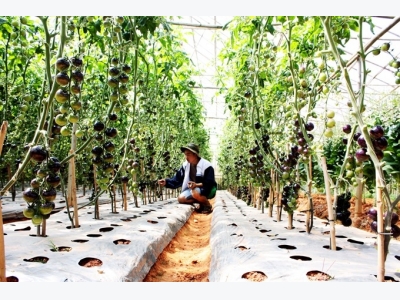Food management a top concern

Black cherry tomatoes in Đà Lạt City. — VNA/VNS Photo Đặng Tuấn
HÀ NỘI — Despite natural disasters and market regression, in the past 11 months, Việt Nam’s total agriculture, forestry and aquaculture export turnover hit US$33.14 billion, though food management still has room for improvement.
Vietnamese agricultural products have been exported to 180 countries and territories, with 2016’s export value $32 billion and the figure set to hit $36 billion this year, said Minister of Agriculture and Rural Development Nguyễn Xuân Cường at the International Support Group (ISG) Plenary Meeting 2017 yesterday.
The event focused on discussing Việt Nam’s participation in the global agri-food value chain, food safety and agricultural consumption.
Nonetheless, Cường said that despite being an agricultural exporting “powerhouse”, 90 per cent of Việt Nam’s products are exported in raw form or of lower quality and value than other countries’ products.
The figures are a record high, with many seafood and green products achieving unprecedented export value of more than $1 billion, said the Ministry of Agriculture and Rural Development (MARD) at the meeting.
Moreover, an alarming portion of Vietnamese agricultural goods are sold abroad without proper branding, or under foreign brands. This disadvantage affects the nation’s status in the global agricultural value chain, he claimed.
At the meeting, World Bank Country Director for Việt Nam, Ousmane Dione, stated that the country still lacks food safety standards and proper testing.
For Việt Nam’s agricultural products with higher value on the global chain such as coffee, pepper, seafood or fruit, food safety is a big challenge that can be overcome with technological advance and heavier public investment, said Dione.
He suggested the agricultural industry shift its focus from production processes to harvesting, slaughtering, storage and distribution, in hope of generating higher value added products, more jobs and higher income.
According to Cường, the agricultural sector’s restructuring for 2017-2020 will emphasise boosting productivity, quality, efficiency and competitiveness, linking raw material production with consumption along the value chain.
As well as small production scale, the country’s agriculture sector faces issues such as inadequate use of resources and a lack of science and technology application with only about 25 to 30 per cent of firms employing modern processing lines, reports from the MARD show.
Việt Nam’s food safety management laws often overlap, making solutions difficult to implement, along with limitations on infrastructure, resources and investment, said the MARD reports.
Cường said the MARD’s intention is to expand distribution channels for both domestic and international markets to create strong national brands.
He stated that the goal of large-scale agricultural and rural production requires efforts from the private sector, research institutions, policymakers and public services
Related news
 National project seeks to improve coffee quality, develop premium brand
National project seeks to improve coffee quality, develop premium brand Vietnamese coffee only accounted for one percent of the world’s total output in 1991; 25 years later, its market share reached approximately 20 percent
 South Korea confirms H5N6 bird flu at duck farm
South Korea confirms H5N6 bird flu at duck farm South Korea confirmed an outbreak of avian influenza (AI) at a duck farm in the southwestern region and culled some 76,000 ducks to prevent the further spread
 Vietnam coffee industry has huge potential: seminar
Vietnam coffee industry has huge potential: seminar The Vietnamese coffee industry has great potential to develop considering the size of the global market and the country’s small share in it